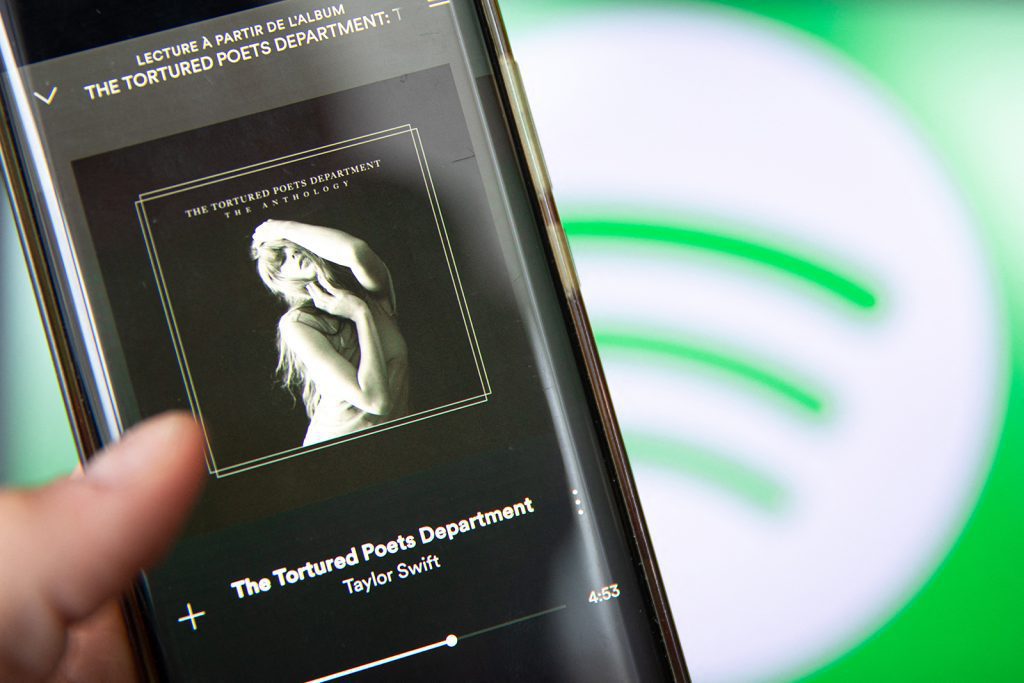Mikael Wood | (TNS) Los Angeles Times
Taylor Swift has been cautioning people not to believe everything they hear about her for years. As the biggest star of pop music’s parasocial age, she argues that gossip and misinformation constantly distort the facts of her life, which is why the Easter eggs and coded messages she’s included in her work have helped create a strong connection between her and her fans. The idea is that if you pay close attention, her art will always reveal the truth.
Except sometimes it doesn’t.
Near the end of her intriguing new album, “The Tortured Poets Department,” Swift releases a lively electro-pop track called “I Can Do It With a Broken Heart.” In the song, she essentially confesses that last summer, during her record-breaking Eras Tour, she was actually struggling despite presenting a facade of living her best life.
“They said, ‘Babe, you gotta fake it till you make it,’ and I did,” she sings over an accelerating groove, “Lights, camera — bitch, smile/ Even when you wanna die.” These are the elements of a very sad song, but “I Can Do It With a Broken Heart” isn’t sad at all; it's sharp, driving, almost joyful. The point is not that she endured this experience — it's that she persevered through it. “I’m so depressed I act like it’s my birthday every day,” she proudly sings in her most cheerful voice, explaining the reason in the next line: “I’m so obsessed with him but he avoids me like a plague.”
Swift's 11th studio LP, released at midnight Eastern time Friday, corresponds with a busy period in the 34-year-old’s personal and professional life: Besides launching the Eras Tour, following 2022’s hugely successful “Midnights” album, Swift — deep breath here — ended her romantic relationship with Joe Alwyn, the English actor she was involved with for over five years; reportedly had a brief relationship with Matty Healy of the 1975 that ended amid controversy over offensive comments he made about Ice Spice; achieved remarkable commercial success with re-recordings of two of her older albums; brought the Eras production to movie theaters; and, oh, also started dating Travis Kelce of the Kansas City Chiefs before his team won Super Bowl LVIII in February.
With its sound situated between the synth-heavy “Midnights” and 2020’s rootsy “Folklore,” “Tortured Poets” encompasses all this, particularly the split with Alwyn, whom she depicts in songs like “So Long, London” as an aloof and indifferent partner. “I stopped trying to make him laugh/ Stopped trying to drill the safe,” she sings. She also recounts the connection with Kelce, whose NFL triumph she references in “The Alchemy”: “Trying to be the greatest in the league/ Where’s the trophy?/ He just comes running over to me.”

Yet this isn’t the breakup album — or the new-love album — you might’ve expected. Swift doesn’t portray herself exactly as a victim as she did in old tunes like “Dear John” or "All Too Well" This album shows a different side of Taylor Swift, with a proud and villainous energy as she embraces her messiest and most chaotic tendencies. Some songs seem to be about Healy, a rock star she alternately roasts as a selfish junkie in "The Smallest Man Who Ever Lived," and describes as the only guy crazy enough to match her in the title track.
"But Daddy I Love Him" is the best song on the album: a dramatic folk-rock song where Swift seems to criticize her audience for disapproving of her and Healy’s affair. She compares her pearl-clutching fans to judgmental creeps and vipers dressed in empaths’ clothing. It's thrilling to hear a superstar address her followers this way in a time of stan culture run amok, and it's wild to imagine the response among those she’s relied on to buy concert tickets and collectible vinyl editions of her records.
"Tortured Poets" is a departure from the self-care pop seen lately from Ariana Grande and Kacey Musgraves. Swift isn’t looking for improvement in these songs about emotional trauma and its aftermath; if anything, she’s taking a strange satisfaction in her unwillingness to learn someone else’s lessons. Olivia Rodrigo's “Guts” explores similar emotional terrain.
This album feels like the spiritual successor to 2017’s “Reputation,” winning album of the year for a record fourth time with “Midnights” at the Grammy Awards.Like on “Reputation,” Swift enjoys portraying herself as the bad guy, as in “Who’s Afraid of Little Old Me?,” where she insists, “I was gentle till the circus life made me mean.” This sets her apart from recent work by
Billie Eilish and Lorde. The album also showcases Swift’s talent as a songwriter, musician, and producer. Her melodies are catchy and her arrangements are captivating.
As a singer, Swift explores her lower, more sensual vocal range in “Fresh Out the Slammer” and the Fleetwood Mac-esque “Guilty as Sin?”; as a songwriter, she goes deeper into details in a way she didn’t on “Midnights,” affectionately remembering a conversation with perhaps Healy in the title track where they both “said Charlie Puth should be a more popular artist” (!) and perfectly capturing the mid-30s stage in “Florida!!!” with a line about how “my friends all smell like weed or little babies.”
“Tortured Poets” finishes with the slow-and-low “Clara Bow,” named after the early-cinema It girl, in which Swift considers all the ways that show business has been consuming — or trying to consume — beautiful young women for the past century. It begins with Bow, then goes to Stevie Nicks before ending with someone who looks in this light like … Taylor Swift, which is truly a name you haven’t heard pronounced until Taylor Swift herself says it.
“You’ve got edge she never had,” the song’s narrator tells the woman — one more challenge on an album full of them.
©2024 Los Angeles Times. Visit
. Distributed by latimes.comTribune Content Agency, LLC. This isn’t the breakup album — or the new-love album — you might’ve expected.









